At a Feb. 5 session of the Russian Security Council, President Dmitry Medvedev finally approved Russia’s updated comprehensive military doctrine, which was published on the president’s Kremlin Web site the following day. But notwithstanding a lengthy period of discussion and consideration, and despite all the developments of the past decade — including the wars in Afghanistan, Iraq and Georgia — the latest version generally supports the same policies as the previous military doctrine adopted in 2000. The doctrine depicts Russia as the target of increasing military threats emanating from NATO collectively and its members individually. It also expresses unease at […]
Latest Archive
Free Newsletter
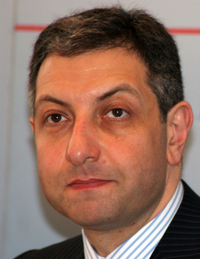
TBILISI, Georgia — Former U.S. President George W. Bush has a highway named after him in Tbilisi, Georgia’s charming and gritty capital, to commemorate his lofty rhetoric in praise of the Caucasian republic’s Western turn in 2003. During Bush’s visit in 2005, the president even eschewed his famous early bedtime to dance the night away in the jubilant Georgian capital. Much has changed since 2005, though. When Russian tanks rolled into Georgian territory in August 2008, Bush chose not to rise to the defense of the West’s ally in the Caucasus. But that was just the beginning. From the indignity […]
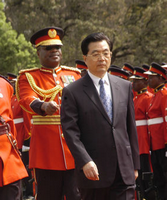
Last week in Cape Town, South Africa, I was a keynote speaker at the massive Mining Indaba conference, the premier annual gathering of global extractive companies involved in Africa’s dominant economic sector. And the difference between the many military and aid conferences I’ve attended on Africa and this international commodities convention in Africa was telling. If you think most Americans now obsess over a “rising” China, you should know that we take a backseat to the Africans on this score. But whereas we often see China’s rise as a potential threat, Africans see it as an opportunity, and China’s “positive […]
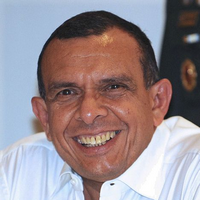
Many Hondurans as well as outside observers of the country’s political crisis breathed a sigh of relief when Porfirio Lobo Sosa was sworn in as president on Jan. 27. Lobo’s inauguration took place nearly seven months to the day after the military, backed by influential opposition leaders, forced former President Manuel Zelaya to leave the country. That marked the beginning of a lengthy power struggle between Zelaya and interim President Roberto Michelletti that thrust the small Central American nation into the international spotlight. Lobo’s inauguration definitively answers the question of who will be president of Honduras in 2010, and closes […]
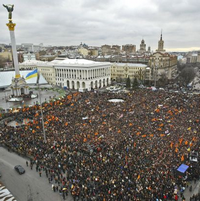
With Ukraine set to vote in the second round of its presidential election on Sunday, both candidates — Prime Minister Yulia Tymoshenko and former Prime Minister Viktor Yanukovych — have promised closer ties with Russia. Most foreign coverage of the campaign has focused on popular disillusionment with the Orange Revolution in particular, and with democracy in general, as the explanation for this dramatic shift since the heady days of 2004. Indeed, a survey of attitudes toward democracy in post-Soviet countries published by the Pew Research Center in November 2009 was sobering: The popularity of democracy had fallen in Ukraine by […]
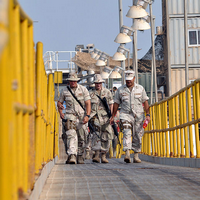
In a two-round bidding procedure that concluded in mid-December, the international oil industry regained access to Iraq’s upstream resources for the first time since the 1975 nationalization, with service contracts awarded for the development of 13 major fields. Although some critics denounced the deals as a sell-off of Iraq’s resources to foreigners, Iraqi Oil Minister Husain al-Shahristani negotiated very good terms for them. Production will rise from the current 2.5 million barrels per day (mbpd) to 12 mbpd, and Iraq will be in control of every drop of oil extracted on payment of fees amounting to only $1 to $1.50 […]

“Iran engagement” is beginning to take on the attributes of kabuki theater, with all of the major participants engaging in pre-determined, stylized dance steps. The latest case in point is the announcement earlier this week by Iranian President Mahmoud Ahmadinejad that Tehran is now open to some form of the scheme proposed by the International Atomic Energy Agency last October, by which Iran would export its low-enriched uranium to France and Russia to be turned into fuel rods for its research reactor. As Howard LaFranchi reported, this “was received favorably by Russia, and it prompted Chinese officials to call for […]
Here are a few of this week’s highlights from WPR’s video section: – Iranian President Mahmoud Ahmadinejad returns to the negotiating table with a deal that makes some observers wary. WorldFocus discusses the warranted skepticism in this video. – Afghan farmers receive attention from the USDA as one of the United States’ top non-military priorities. Secretary of Agriculture Tom Vilsack briefs the press in this video. And agricultural initiatives can be seen at work in this video. – Secretary of State Hillary Clinton discussed positive developments in N. Ireland in this video. Our video section is updated daily. I’ll highlight […]
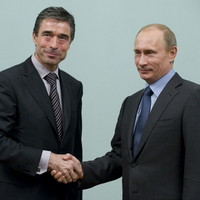
The Economist recently broke the news that NATO would soon develop contingency plans to defend Estonia, Latvia, and Lithuania against Russian attacks. In an unexpected shift in policy, the new plans would mark the first time since the end of the Cold War that the Atlantic Alliance has specifically pinpointed Russia as a threat. NATO has been down this road before. In October 2008, Gen. John Craddock, then NATO’s supreme commander, asked the members of the alliance for permission to draft Baltic defense plans. But at the time, France and Germany disapproved, out of fear that it would compromise NATO’s […]
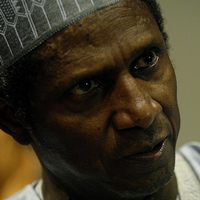
When Nigerian President Umaru Yar’Adua left the country in November 2009 to seek treatment for a heart ailment, few anticipated that both he and Africa’s most populous country would end up on life support. The leadership crisis resulting from Yar’Adua’s failure to constitutionally hand over power to Vice President Goodluck Jonathan — either at the time of his departure or since — has had more than just political implications for Nigeria. It has rocked the oil sector and threatened to undo substantial security gains made in the oil-producing Niger Delta, following a mostly successful amnesty and demobilization program for the […]
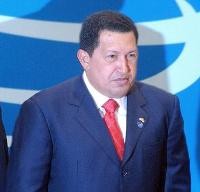
In the 11 years since Hugo Chávez became president of Venezuela, the country has experienced almost constant political and economic drama. The past decade brought a cinematic — and ultimately failed — coup d’état against the president, a national strike that brought the economy to its knees, border disputes complete with tank deployments, and a string of controversial nationalizations of private businesses, to name just a few of the remarkable developments that have marked the Age of Chávez. Despite the stiff competition of years past, though, 2010 is already taking shape as a year of reckoning for the country, the […]
France 24 just posted last Friday’s panel discussion program, The World This Week, which I took part in along with John Vinocur from the IHT, Pierre Rousselin from Le Figaro and Gerry Feehily from Presseurop.eu. . Part one is here, part two is here. I developed the thought behind the first point I made, on Tony Blair’s justification for the Iraq War, in a blog post here. As I mention in the post, the idea occurred to me pretty spontaneously, and I’m not sure I articulated it very clearly on the program. Besides that, we discussed the London conference on […]
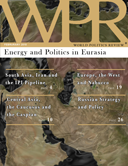
This WPR Special Report compiles news, analysis and opinion from WPR’s pages to provide insight into what some are calling the new “Great Game” — the political battle for influence and control over the production, sale and transit of oil and gas across Eurasia — from Europe to the Caucasus, to Iran, to South and Central Asia. Below are links to each article, which subscribers can read in full. Subscribers can also download a pdf version of the report. Not a subscriber? Subscribe now, or try our subscription service for free. South Asia, Iran and the IPI Pipeline Pipeline Politics: […]
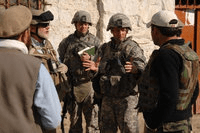
U.S. Air Force Capt. Tyler Rennell and his Afghan student pilot had a communication problem. On a Nov. 2 training flight near Kandahar, Rennell was trying to teach Capt. Moeed, his Afghan air corps trainee, how to use a GPS device to navigate their Mi-17 helicopter. Moeed didn’t seem to understand the device’s terminology, and Rennell didn’t know how to explain it to him. Every word that Rennell and Moeed exchanged had to pass through a Pashto-speaking interpreter sitting in the back of the helicopter, listening in via the chopper’s intercom. “Tell him,” Rennell urged the interpreter, after describing the […]
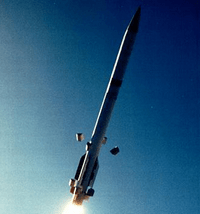
Last Friday, the U.S. Department of Defense announced the approval of a major arms sales package for Taiwan. The $6.4 billion deal includes 114 Patriot advanced capability (PAC-3) missiles, 60 Blackhawk helicopters, and two Osprey-class mine-hunting ships, among other items. The Obama administration is still considering Taiwan’s request for the F-16 C/Ds that it wants to replace some of its aging fighters. As it has in the past, Beijing quickly expressed its indignation through multiple channels. Foreign Ministry officials denounced the arms sales as interference in China’s internal affairs and China’s official media warned that the decision would “inevitably cast […]
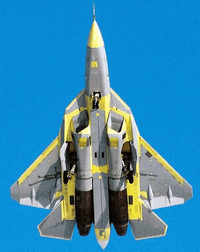
On Jan. 29, a Russian pilot conducted a test flight of the first warplane entirely designed and built by Russian companies since the Soviet Union collapsed in 1991. The plane, formally known as the Prospective Aircraft Complex of Frontline Aviation (PAK FA), is manufactured by the state-owned Sukhoi aircraft corporation. Russian sources describe the PAK FA as the first fifth-generation multi-role fighter/attack warplane built outside the United States, but some analysts doubt it meets that category’s criteria. “Fifth-generation” warplanes have stealth characteristics, making them almost invisible to conventional radars. These attributes include using composite materials, emitting reduced engine heat, and […]
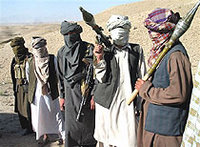
While considerable disagreement exists on precise steps for creating a more stable Afghanistan, most key international policymakers now agree that any successful strategy there, and in Pakistan, hinges on the ability to mainstream anti-government fighters and potential fighters into the political and economic systems in those countries. That was reflected in the communiqué that emerged from last week’s London summit on Afghanistan, which called for, among other things, reintegrating Taliban who cut ties with al-Qaida and other extremist networks. But more attention needs to be given to the difficulties involved with such an approach, which will likely prove extremely challenging […]
